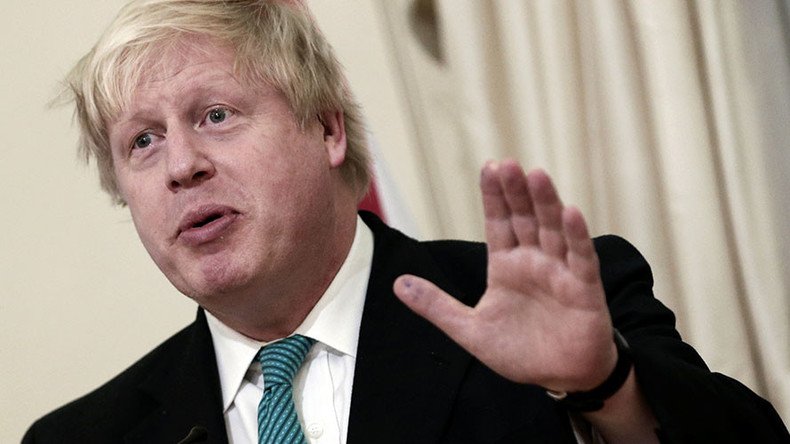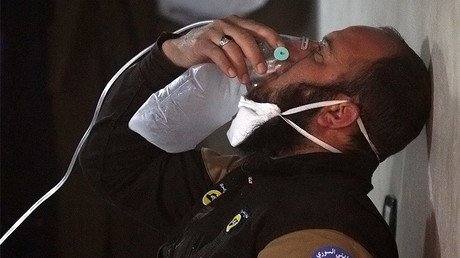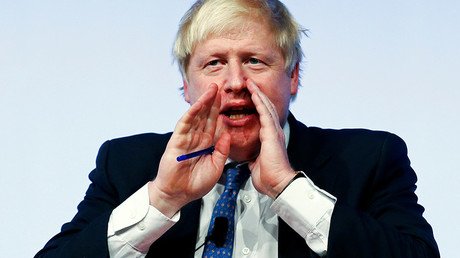‘Hard to say no’: Johnson hints parliament vote against Syria invasion may be ignored at US request

It will be “very difficult” for the UK government to refuse military assistance to the US in Syria if they expressly ask for it, British FM Boris Johnson has said, responding to an MP’s question on if he intends to heed parliament’s vote against the incursion.
British Foreign Secretary Johnson was on Tuesday briefing MPs on the situation in Syria and North Korea, when he was posed with a question by former Parliamentary Under Secretary of State at the Foreign and Commonwealth Office and Conservative MP, Alistair Burt. Burt asked what the UK government’s reaction would have been if, instead of just hitting Syria’s Shayrat airfield on April 7, Washington decided to first enlist military help from Britain.
When asked if he and the British government consider themselves to be “bound” by the past decision not to intervene in Syria and plan to reinvigorate the parliamentary debate or “if not, what might the United Kingdom be able to do to demonstrate its force and resolve,” Johnson hinted that the UK is ready to back Washington not only politically but also militarily.
“We were not asked for specific support, but it is my belief—I stress that no such decision has yet been taken—that were such a request to be made in future and were it to be a reasonable request in pursuit of similar objectives, it would be very difficult for the United Kingdom to say no,” the top British diplomat said, without elaborating.
Johnson’s Tuesday comments seem to indicate a departure from a previous UK policy on Syria that has been in place since a dramatic House of Commons vote on the issue in 2013, which ended in a crushing defeat for interventionist bid championed by former Prime Minister David Cameron.
.@BorisJohnson has also said ‘not even Hitler used chemical weapons.’ https://t.co/2CQG4SfULO
— RT UK (@RTUKnews) April 12, 2017
Alistair reminded Johnson of the Parliament’s decision to vote down the motion that would have authorized military involvement into Syria back in August 2013 under fairly similar circumstances. At the time, the rebels accused the Syrian government of perpetrating a sarin gas attack in a Damascus suburb. The allegations were strongly denied by the Syrian authorities, which, in turn, blamed the militants, claiming it was a false-flag operation. Later, former US Secretary of State John Kerry confessed that British MPs’ lack of support for the mulled US airstrikes in Syria at the time led to delay in decision-making in Washington and thus derailed the operation.
READ MORE: Britain derailed Obama’s plan to bomb Syria – US Secretary of State
While the defeat in Parliament dealt a heavy blow to Cameron’s foreign policy ambitions, he conceded, saying that although he “strongly believes” in the need for military intervention in Syria, “it is clear” that “the British Parliament, reflecting the views of the British people, does not want to see British military action.”
Johnson reiterated that in attacking Syria “the United States has acted with the full support of the British Government,” adding that the “only one conclusion” that could be reached based on the known evidence of the alleged chemical attack in rebel-held Idlib province is that “the Assad regime almost certainly gassed its own people.”
Weighing in on the implications of the US strike, which he praised as an “emphatic message” by the US administration, he alleged that it “has changed the terms of trade” in Syria and lay foundation for “political change.”
“America’s determined response creates an opportunity to break the deadlock and pave the way for a political settlement of Syria’s tragedy,” Johnson said, adding that Moscow should pursue the Syrian authorities to launch this process.
Johnson also commanded UK’s own efforts in investigating the chemical incident in Khan Sheikhoun, claiming that it is “thanks in large measure to UK diplomacy, the United Nations now has a joint investigative mechanism with a mandate to identify any party responsible for chemical attacks in Syria.”
Earlier, Russian Foreign Minister Sergey Lavrov cast doubt on the impartial character of the OPCW fact-checking missions, entrusted with investigation of the alleged chemical attack, calling it “a very strange coincidence” that they are both chaired by the British citizens.
Lavrov argued that composition of the missions “runs contrary to the principles of an international organization, the structures of which must be maximally balanced.”














